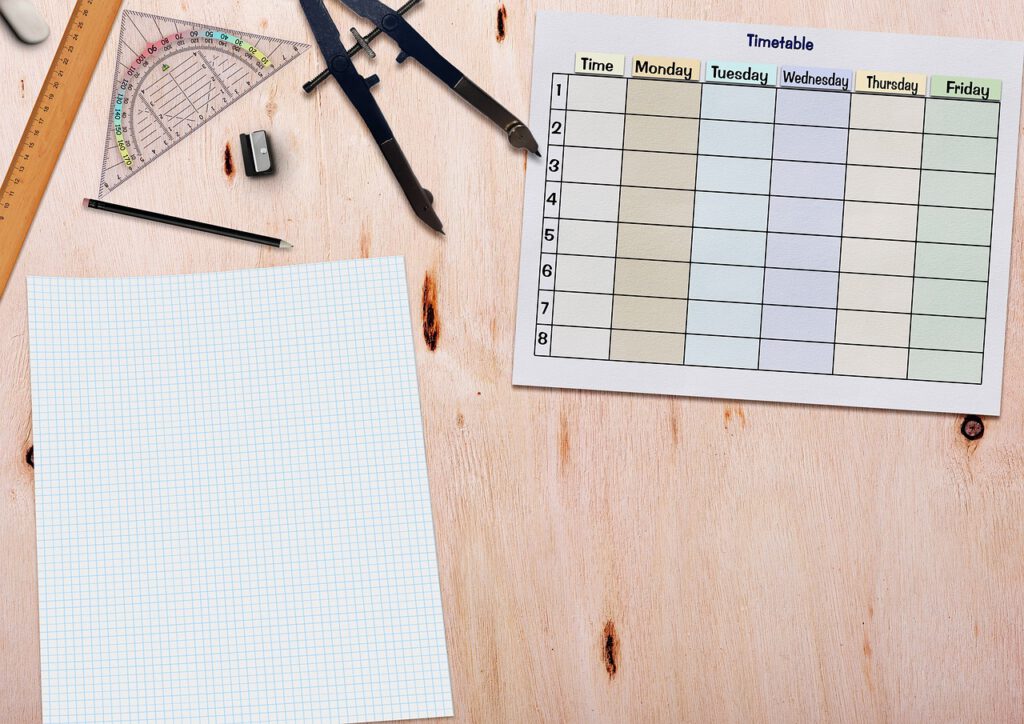Do you feel overwhelmed by a mountain of scripts, presentation deadlines, and assignment due dates? Mastering time management for students can be a huge challenge amidst all this chaos.
No need to panic.
That’s precisely the challenge. In your studies, you’re being tested—tested on whether you can organize yourself well enough to meet all the requirements for your desired degree. The pressure that arises from this is artificial and exists only in your mind.
There’s a simple way to transform time pressure into boundless energy.
In this video, I want to show you how by revealing three crucial secrets. Once you have understood these secrets, you can master the mercilessly ticking countdown of each semester and achieve all your academic goals with ease.
#1 Setting priorities
The first secret most students do not know that time is not the issue. The issue is setting the right priorities.
Take a step back and look at your semester from a bird’s-eye view. It’s best to take a sheet of paper and write down all your subjects.
Now, break down each subject into its respective tasks (e.g., exams, presentations, assignments, etc.).
Now, put the individual tasks in order by evaluating them based on certain criteria:
- number of credit points
- proximity to the deadline
- personal interest in the topic
- current progress/knowledge level
Some of these factors may be important to you (e.g., credit points), while others may be more secondary (e.g., fascination with the topic). But it could also be exactly the opposite. Only you can make this assessment.
It’s important that you do.
By considering the proximity to the deadline, you’ve added a time dimension, which is helpful for visualization.
The whole thing might look something like this:
[Here, you can create a visual representation with the courses and tasks ranked according to the criteria mentioned above.]
The end of each bar marks the submission date, and the length of the bar marks the time you allow for each project.

#2 Goal Setting
The obligatory quote to emphasize the importance:
“The slowest one who does not lose sight of his goal will still move faster than the one who wanders aimlessly.” (Gotthold Ephraim Lessing, German Philosopher)
Setting goals while you study is essential. Otherwise you don’t know in which direction you need to go.
Plus, it’s not enough to just think about your goals.
Goals must be written down and regularly reviewed.
For managing your time during the semester, I suggest a three-tiered structure: months, weeks, and days.
Monthly Goals: Let’s assume the scenario I showed you with the exam, the presentation, and the assignments takes place within a single month. Your four tasks can be formulated as four monthly goals:
- I pass my retake in Course B with a grade of X or better.
- I receive a grade of X or better for the presentation in Course A.
- I pass the assignment in Course A with a grade of X or better.
- The poster in Course C earns me a grade of X or better.
If the timeframe for completing an assignment (or the study phase for an exam) extends over two months, you can formulate your goal differently:
- By the end of the month, I have completed the literature review and theoretical framework (at least 6 pages of text) for the assignment in Course D.
- Summarize and review scripts 1-8 for the exam in Course E twice each by the end of the month.
Weekly Goals: Your weekly goals differ from the monthly level in that you can be more specific about your intermediate objectives.
- By the end of the week, I have watched and transcribed 8 out of 12 learning videos from Course B.
- The literature research for the assignment in Course A is completed by the end of the week (at least 40 high-quality literature sources).
Review your weekly goals every Sunday evening and set new ones for the upcoming week.
- What worked?
- What didn’t?
- How can you approach things better to achieve all your goals this week?
Of course, you must approach goal-setting in a way that aligns with your monthly goal (If you plan to watch 2 learning videos per week, but there are 12 in total, you won’t achieve it in one month).
Daily Goals: Now, go one level deeper and divide your days. There are two possibilities:
- Create themed days: In this first approach, you dedicate each day to only one thing (in this case, a task for a specific course). For example, Monday to Wednesday could be study days for your exam, and Thursday to Saturday could be solely for your assignment.
- Plan every day the same: The right strategy depends on your daily schedule. If you have full-day lectures or work on three days a week, you need to adjust your daily planning flexibly.
During the lecture-free time, you can structure your perfect study day by dividing it into blocks that correspond to your priorities and other factors such as your biological rhythm and learning type (e.g., morning person vs. night owl).
Place the activities for the top priority at the beginning of the day as willpower will decrease later.
An optimally structured study day could look like this:
[Here, you can create a detailed schedule for a study day with different blocks of activities, taking into account your preferences and circumstances.]

#3 Treat studying like a job
When it comes to time management in your studies, you are allowed to think completely in black and white for once.
What do I mean by that?
When you close your book, you’re done for the day.
Studying doesn’t have fixed working hours like a job. You have to create them for yourself.
If you don’t, thoughts about tasks will haunt you right after waking up, before going to bed, or even on weekends.
You can forget about all tasks with a clear conscience once you’ve completed your daily goal.
It’s crucial to switch off completely.
When you’re doing sports or meeting friends, university-related thoughts should have no place in your mind.
Conversely, the same applies.
When you’re in a study session, your phone has no place on the table.
If you get distracted, you won’t achieve your goal, and you’ll need more time to reach the same result. Leave your phone in a locker at the entrance to the library; it helps.
Final Thoughts
The achievement of your goals, even if they are just small ones, must be celebrated.
Reward yourself with something that brings you joy and that you look forward to.
I have discussed this topic in more detail before in my video on study motivation.
You can also motivate yourself by making your progress visible.
You can add small checkboxes to your daily goals if you find satisfaction in ticking off tasks.
I use the same technique for my research papers.
Whenever a paper reaches a new round of revisions or is accepted somewhere, I give its entry in my list a new label and a nice colour.
This small ritual gives me tremendous satisfaction. And it motivates me to master this list, even though I am the only person that knows this list exists.
Additionally, keep reminding yourself why you are doing all of this.
There is hardly a greater motivation than pursuing the dream that lives deep inside you.
And have fun along the way.
